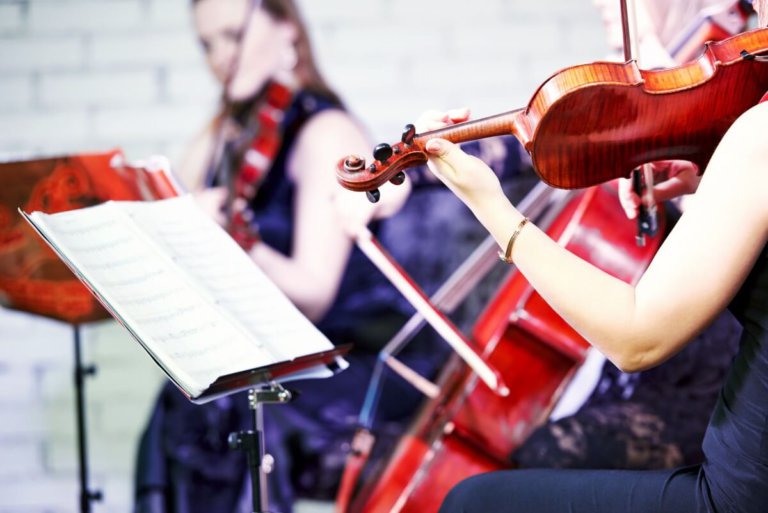
A Performer’s Certificate from the University of Connecticut (UConn) is a coveted achievement for any budding musician; not only does it promise the prestige of the UConn name, it means the learner has attained a greater mastery of their chosen field.
Delivered through the distinguished Department of Music, the UConn Performer’s Certificate aims to provide a concentrated course of study in performance for outstanding musicians who have completed a Bachelor’s or Master’s degree from a university or music conservatory in the US or an international equivalent.
With certificates available in the musical areas of Strings, Woodwinds, Brass, & Percussion, Piano, Voice and Conducting, UConn lifts any limitations that may have been placed on students’ potential and encourages them to take their performance passions further.
Playing a pivotal part in your performance
Based in the creative region of New England, enrolling onto a Performer’s Certificate connects you to a close-knit community of international musicians and innovators.
Granting you the opportunity to focus on your performing technique, this one-year course of study balances your time between practice and theory, opening your eyes to the possibility of pursuing Master’s disciplines.
For instance, the Performer’s Certificate of Strings, Woodwinds, Brass & Percussion provides courses that focus on Applied Music, Orchestra or Wind Ensemble and Graduate Chamber Ensemble.
With the requirement of one public recital, usually during the spring semester, you’ll familiarise yourself with the foundations of performance and start showcasing your newfound skills.

Sophie Shao
Winner of the prestigious Avery Fisher Career Grant and a UConn Assistant Professor of Cello, Sophie Shao stands by the prospects of the Performer’s Certificate, saying it is the golden ticket to musical success for any budding young talent.
“I think a Performer’s Certificate at UConn allows a student to have the company of talented students while they focus on improving their own playing. They get to play in orchestras and make musical friends while having private lessons on the instrument that’s suited to their personal career goals.
“The relatively rural location allows them to focus more intensely and create deeper friendships with their peers,” Shao says.
A community of encouragement
Alongside an Assistant Professor of Cello, Shao is an Instructor of String Techniques. Testifying that the UConn Department of Music is an encouraging and influential community of faculty members and learners, Shao explains that everyone is welcome to unite their aspirations with UConn.
“I love working with students when they are receiving a broad education in both music as well as other subjects. Music is interdisciplinary and UConn provides the resources for students to learn about anything they’re interested in,” she says.
While studying your chosen discipline, the artist-teachers like Shao will steer you through every module. And if you have any trouble with understanding concepts, their professional guidance will pull you through and place you on the right page.
With an emphasis on community engagement, your Performer’s Certificate coincides with numerous campus events and performances.
For example, the von der Mehden Recital Hall hosts nearly 130 annual concerts on campus, there’s engaging UConn Choral Festivals, Opera Outreaches, and the nearby Jorgensen Center for the Performing Arts is where you’ll witness the gathering of world-renowned artists.
Enjoying his time at the UConn Department of Music, current student Owen explains that the department gives frequent opportunities of performances, free English language lessons, career training, competitions, and gigs that build up students’ experience and connections to prepare for future roles.
Composing your career success
An educational ensemble of opportunities, UConn enables you to compose your career plans strategically, and successfully.
For Owen, the department offered him an assistantship as an ensemble librarian, which is an excellent career-building opportunity as he gets to know about how the music library works and how to cooperate with different conductors.
 Yet, the main reason he applied to UConn was because of the academic professors, specifically Professor Sophie Shao.
Yet, the main reason he applied to UConn was because of the academic professors, specifically Professor Sophie Shao.
“The teachers are not only extremely knowledgeable but also inclusive to students. Professor Shao is one of the most popular cellists on the east coast. Her music-making and techniques are tremendous. Plus, she has great experiences of performances so I can learn a lot from her,” Owen says.
Focused on applied lessons with a professor, ensemble work and chamber music, no academic courses are required on a Performer’s Certificate program and English as a Second Language (ESL) courses are available nearby.
Yet, if you wish to continue your professional journey at UConn, you can opt for the Master of Music (M.M), the Master of Arts (M.A), the Doctor of Musical Arts (DMA) in Performance or Conducting, or the Doctor of Philosophy (PhD).
And for the M.M concentrations, you can choose from Instrumental Performance, Vocal Performance, Instrumental Conducting and Choral Conducting, and M.A topics include Historical Musicology and Music Theory.
For specific information concerning your preferred UConn Performer’s Certificate, refer to this informative Graduate Handbook for guidance about getting started.
Follow UConn Music on Facebook, Twitter and Instagram
Liked this? Then you’ll love…
Preparing students for a bright future in music
UConn Music: Providing pathways to graduate education through performance







